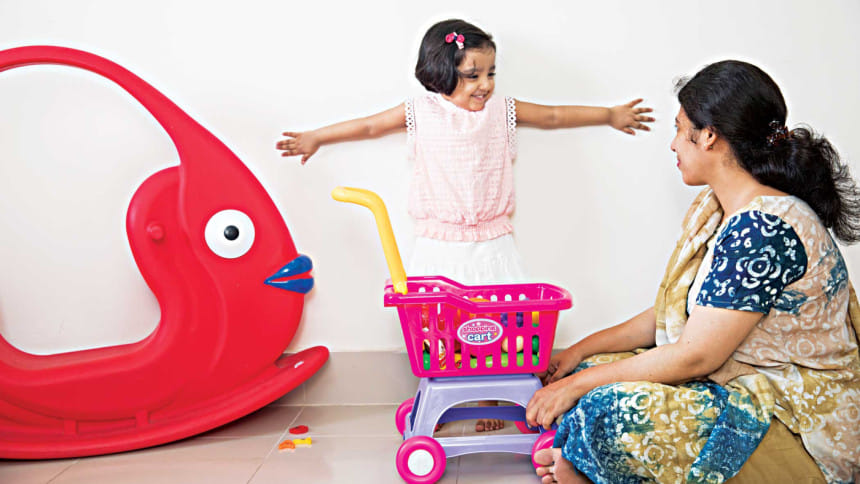Spirituality and the next generation: How does spirituality affect your children?

Children are impressionable. They are unsure of their place in this world. In a conservative country like ours, most children are raised to be religious and by extension, hold many spiritual beliefs. Higher power, divine judgement and a "second life" are just some of the core beliefs taught to children via organised religion.
"Religious spirituality is the only spirituality you'll ever need. A true follower of Islam will never feel lost or without purpose," says Khadeza Akter, a devout Muslim and mother of three young boys.
"Youngsters these days are suffering from stress and depression due to their lack of faith. If they had faith in the wisdom and strength of a higher power, then they would realise their true potential."
She also added, "Social media and western ideals have alienated us. We are more alone now than ever before. But faith and spirituality can bring us together. Taking part in religious acts like praying and fasting can give people a sense of community and belonging."
In spite of these obvious similarities, religion and spirituality are not the same. Religion is based on believers following a specific set of doctrines and practices alongside a likeminded community. While this may be appealing to many, some people would prefer greater flexibility with their beliefs. They may also be more interested in spiritual practices that exist outside their own culture and norm.
One of the biggest ideas within spirituality is the idea of the afterlife. The concept exists in nearly all of the major religions and it exists as a way to show that the physical world or "first life" is not the end of it all. It also serves the purpose of teaching children that actions have consequences.
This is something Sayedur Rahman, father to a six-year-old, firmly believes. "Children aren't capable of empathising like adults are. It doesn't make as much sense for them. However, the idea of an unavoidable judgment actually motivates them to change their behaviour. If you do bad deeds, you'll get punished. Consequently, if you do good deeds, you'll be rewarded."
When I asked him if only the idea of heaven and hell is adequate to deter children from committing bad deeds, he answered "Yes, it is. Over time, they'll understand things like altruism and empathy. But when they're young, the fear of hell can push them away from misbehaviour. It's the best way to teach little children to be respectful towards one another. As they grow older, their ideas change but these core values and belief stay the same, more or less."


In a world where corruption runs rampant and deception seems like a skill to be rewarded rather than a sin to be shunned, the idea of divine justice may just be what children need. It inspires hope and positivity. It assures them that no matter what, evil will be punished.
While the idea of an afterlife can act as a way of ensuring justice, it can also act as a salve. Death is a confusing concept for children. Most are incapable of processing the trauma of losing a loved one. Spirituality introduces the idea of an Elysium, a paradise world for the pure of heart. "It gives them joy knowing that their loved ones are still out there, happy and safe," says Rahman.
While a solid majority of parents speak in favour of spirituality, there are some who don't feel strongly about it.
"Spirituality isn't mandatory to have a moral compass. It's far too abstract of a concept and it would just skew their own thinking. If they want to learn it of their own volition, sure but I don't think it's something necessary," says Sameera Khan. A mother of two teenage daughters, Khan believes that spirituality should be explored out of curiosity but not introduced as the only true path in life.
"Children need to have the freedom to learn about the world at their own pace. Forcing them to follow a certain path at such a young age would bring more harm than good. If I see them being swayed to something harmful, I can gently guide them back to the right path. But forcing them to learn of the afterlife, higher powers, and divine justice is far too much."
When asked if the lack of spirituality would lead to children having a weaker moral code, she replied, "No, it won't. Kids don't need to be scared of hell to stop themselves from doing misdeeds. Children understand empathy and human emotions fairly well. Many people underestimate how emotionally intelligent kids can be. They don't need to be frightened with stories of hellfire and eternal torment."
Regardless of your stance on the effectiveness of using spirituality to reinforce a child's moral fibre, there is no denying the role of spirituality in giving people a sense of purpose. Children often struggle with their place in the world. They can't quite figure out who they are and what they should do. Spirituality can offer an answer to this via belief in a higher existence and practices such as meditation or prayer.
While this is a popular solution, many people like Khan are dismissive of spiritual learning, especially for young and impressionable children. She added, "Children hold on to these kinds of spiritual beliefs strongly. Especially if they were introduced to them at a young age. So, when they get older, they're not willing to learn new things or at least be flexible with their ideals."
Childhood is a vulnerable and sensitive stage in one's life. You absorb the most knowledge and experience during this stage. The fear that Khan shares with a large number of likeminded parents is that spiritual learning at a young age will create unhealthy biases and skew their logical thinking.
Regardless of your own stance on this issue, one thing remains clear. Spirituality or lack thereof, is integral to our individuality. Even if you do not consider yourself a spiritual being, you cannot deny its significance in human history and its continued significance in modern society. And while being introduced to spirituality at a young age can grant you peace and purpose, it can also make you put your beliefs on a pedestal and be unwilling to embrace new ideas.
So what's the solution here? Do we introduce spirituality to give our children a sense of higher purpose, peace and belonging? Or do we simply give our children the freedom to figure out who they are and their place in the place in the world? It's hard to say. But like any other complex dilemma sometimes it important to just take a step back and follow your heart.
Photo: LS Archive/Sazzad Ibne Sayed

 For all latest news, follow The Daily Star's Google News channel.
For all latest news, follow The Daily Star's Google News channel. 



Comments